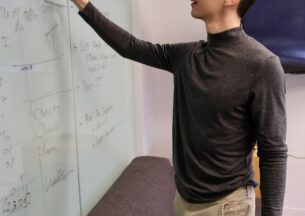Innovation at the Forefront: UChicago CS Researchers Make Significant Contributions to CHI 2025

The ACM CHI Conference on Human Factors in Computing Systems is a premier international conference where researchers and practitioners gather to discuss the latest research in human-computer interaction. Held annually, CHI brings together experts from academia and industry to present groundbreaking research, share insights, and explore future directions in the field. This year, the conference embraces the theme of Ikigai, a Japanese concept referring to what gives a person a sense of purpose, a reason for living. Ikigai concerns the ability of a person to find their purpose and balance their agency, their passion, their capabilities, and the impact they can have. CHI hopes to harness the power of Ikigai into a communal ‘IkiCHI’ — such that the community can be greater than the sum of each individual’s efforts and offer unique contributions to solving the challenges ahead.
CHI 2025 showcases a wide scope of HCI research at the University of Chicago Department of Computer Science that can speak to this theme, ranging from sensory and expressive haptics to communicating with natural language. The program features ten full papers exploring innovative topics, including on-body haptic design, e-waste repurposing, sensory substitution technology, power solutions for interactive devices, natural language programming, generative AI applications, and digital privacy concerns. AxLab’s paper on Shape-Kit and Professor Chugh’s Lab on Slowness, Politics, and Joy: Values That Guide Technology Choices in Creative Coding Classrooms were awarded honorable mentions to the Best Paper Award.
Beyond papers, UChicago researchers are leading a talk on electronic waste reuse, contributing to interactive demonstrations of novel interfaces and adaptive electrical muscle stimulation, participating in a panel discussion addressing generative AI’s impact on artists, and co-organizing several workshops and even teaching one course. This impressive showing demonstrates the department’s strength across HCI research, with contributions from multiple labs including the Human Computer Integration Lab, SUPERgroup, AIR Lab, NOISE Lab, and AxLab.
The full list of papers and contributors can be found below:
UChicago authors in bold.
* denotes papers that include interactivities
FULL PAPER
Shape-Kit: A Design Toolkit for Crafting On-Body Expressive Haptics*
Honorable Mention for Best Paper Award
Ran Zhou, Jianru Ding, Chenfeng Gao), Wanli Qian, Benjamin Erickson, Madeline Balaam, Daniel Leithinger, Ken Nakagaki
AxLab — [paper link]
Slowness, Politics, and Joy: Values That Guide Technology Choices in Creative Coding Classrooms
Honorable Mention for Best Paper Award
Andrew McNutt, Sam Cohen, Ravi Chugh
Ravi’s Lab — [paper link]
ProtoPCB: Reclaiming Printed Circuit Board E-waste as Prototyping Material*
Jasmine Lu, Sai Rishitha Boddhu, Pedro Lopes
Human Computer Integration Lab — [paper link]
Seeing with the Hands: A Sensory Substitution That Supports Manual Interactions*
Shan-Yuan Teng, Gene S-H Kim, Xuanyou Liu, Pedro Lopes
Human Computer Integration Lab — [paper link]
Power-on-Touch: Powering Actuators, Sensors, and Devices during Interaction*
Alex Mazursky, Aryan Gupta, Andre de la Cruz, Pedro Lopes
Human Computer Integration Lab
Adaptive Electrical Muscle Stimulation Improves Muscle Memory*
Siya Choudhary, Romain Nith, Yun Ho, Jas Brooks, Mithil Guruvugari, Pedro Lopes
Human Computer Integration Lab
How Humans Communicate Programming Tasks in Natural Language and Implications For End-User Programming with LLMs*
Madison Pickering, Helena Williams, Alison Gan, Weijia He, Hyojae Park, Francisco Piedrahita Velez, Michael L. Littman, Blase Ur
SUPERgroup — [paper link]
Generative AI Uses and Risks for Knowledge Workers in a Science Organization*
Kelly B. Wagman, Matthew T. Dearing, Marshini Chetty
AIR Lab — [paper link]
Dark Patterns in the Opt-Out Process and Compliance with the California Consumer Privacy Act (CCPA)*
Van Tran, Aarushi Mehrotra, Ranya Sharma, Marshini Chetty, Nick Feamster, Jens Frankenreiter, Lior Strahilevitz
NOISE Lab — [paper link]
Underspecified Human Decision Experiments Considered Harmful
Jessica Hullman, Alex Kale, Jason Hartline
Data Cognition Lab — [paper link]
TALK (Journal Paper)
Unmaking Electronic Waste
Jasmine Lu, Pedro Lopes
Human Computer Integration Lab
INTERACTIVITY
Pino: Design and Development of a Spherical Pin Array Interface and Exploration of Interactivity
Ryuhei Sugimoto, Ken Nakagaki, Huroyuki Kajimoto
Kajimoto Lab (UEC)
Adaptive Electrical Muscle Stimulation Improves Muscle Memory
Siya Choudhary, Romain Nith, Yun Ho, Jas Brooks, Mithil Guruvugari, Pedro Lopes
Human Computer Integration Lab
PANEL
Forging an HCI Research Agenda with Artists Impacted by Generative AI
Harry H. Jiang, William Agnew, Tim Friedlander, Zhuolin Yang, Sarah E. Fox, Michael S. Bernstein, Josephine Charlie Passananti, Megumi Ogata, Karla Ortiz
SAND Lab
WORKSHOP
Sensorimotor Devices: Coupling Sensing and Actuation to Augment Bodily Experience
Paul Strohmeier, Laia Turmo Vidal, Gabriela Vega, Courtney N. Reed, Alex Mazursky, Easa AliAbbasi (MPI), Ana Tajadura-Jiménez , Jürgen Steimle
Human-AI Interaction for Augmented Reasoning
Valdemar Danry, Pat Pataranutaporn, Christopher Cui, Jui-Tse (Ray) Hung, Lancelot Blanchard, Zana Buçinca, Chenhao Tan, Thad Starner, Pattie Maes
Chicago Human+AI Lab
Designing for Agency in LLM-Infused Writing Support Tools for Science Journalism
Sachita Nishal, Mina Lee, Nicholas Diakopoulos, Jennifer Wortman Vaughan
COURSE
How to Design, Build, and Use Interactive Electrical Stimulation
Yudai Tanaka, Pedro Lopes
Human Computer Integration Lab













